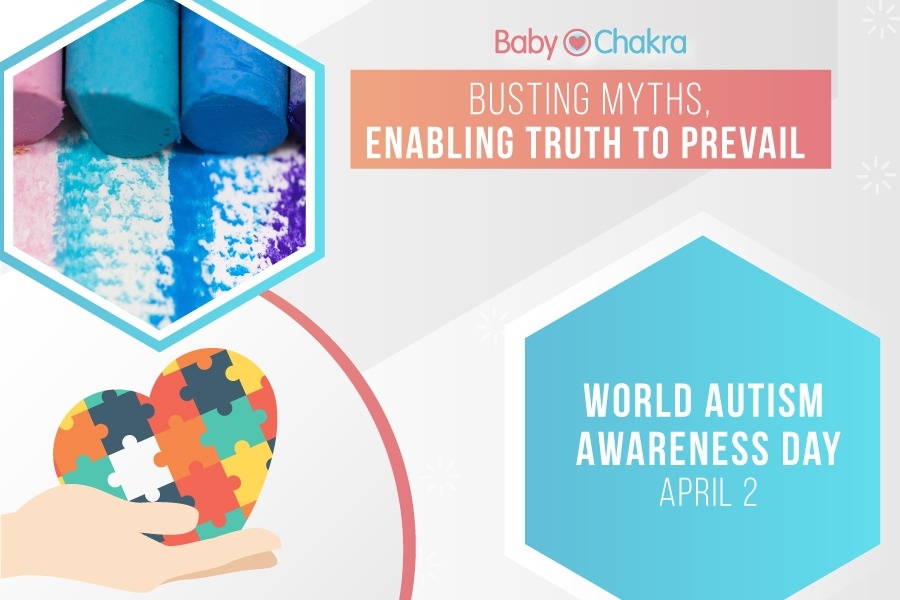
Autism: Taking Away The Enigma, Keeping It Simple
2 Apr 2018 | 5 min Read
Babychakra
Author | 1369 Articles
This article has been authored by Dr Samir Dalwai. Dr Samir H Dalwai is a Developmental Pediatrician and legal expert who has pioneered the concept of interdisciplinary services for children in India. He is on the National Executive Board of the Indian Academy of Pediatrics. He has founded New Horizons Child Development Centre and Research Foundation (www.enablemychild.org) which has 5 centres across Mumbai. He is attached to Nanavati Superspeciality Hospital and to Hinduja HealthCare Hospital.
Autism is one of the most important “epidemics” being seen in the modern world. One out of sixty-eight children are diagnosed to have autism – that is about one and a half percent of the population.
April is observed as Autism Awareness Month and April 2nd is observed as World Autism Awareness Day. Though awareness as a whole has increased, there is often lack of clarity related to autism. Parents are often left confused and crucial time is wasted before the child receives appropriate intervention.
Here are some common myths and the reality regarding Autism.

Myth – Autism starts after two years of birth!
Reality – The American psychiatrist Leo Kanner, who was the first to describe autism in 1943, wrote “Autism exists from the very beginning of life”. Thus, deficiencies associated with autism like lack of interaction, thereafter, poor nonverbal, and thereafter, poor verbal communication are present right from the beginning.
Myth – The only problem is that my baby doesn’t speak, it’s not like he doesn’t understand- hence, this cannot be autism.
Reality – Lack of speech may be the first alarm bell for parents. They may need to note whether the child is also failing to comprehend what is spoken to him and, whether, is poor at non verbal communication as well.
If I have to summarize my questions to the parent of a child who has a delay with speech at say, two years of age, it would be this:
- Does your child fail to carry out two or three step simple commands (verbal commands, given without gestures)?
- Does your child not have very good interaction with you, as much as other two year olds?
- Does your child not interact with you most of the times by joyfully reciprocating when you call out to him or when you extend your arms for a hug or only rarely?
- Does your child seem to prefer objects to you or other people?
- Does your child find it more engaging to spend time in activities which are a little meaningless, like rather than playing with a toy car as such, he prefers to only spin the wheels or just open and shut the doors?
- Does your child, when excited or angry, rather than engage with you, prefer to engage himself In meaningless spinning, or flapping or rocking?
If these questions leave you suspecting that things may not be quite right, please consult a Developmental Pediatrician.

Myth – One doesn’t need detailed reports or evaluations but just some therapy.
Reality – Unless carefully evaluated, many children are wrongly labelled as autistic and equally, many children with autism are missed. Moreover, many associated conditions may be missed. There are many details that need to be assessed and worked on; without detailed reports these can be missed.
Therapy without documentation is like driving blindfolded on a highway. You would never know if the child could have done better. Without programs, therapy is an endless frustrating process with helpless parents not knowing anything about the process.
Myth – Vaccination causes autism
Reality – Vaccines are as necessary as they are safe and effective. Evidence and data from the world over shows that vaccines do enormous good and very little harm. Reiterating the fact that autism is present from birth, I would say that research has clearly proven that vaccines do not cause autism.

Myth – Stem Cell Therapy can cure autism
Reality – There is no evidence that Stem Cell Therapy cures autism. Autism is not a disease. No treatment can completely “cure” autism. Stem Cell Therapy is still in an experimental stage and cannot be charged for by misleading patients to believe that it cures autism.
To summarize:
- There is an increased awareness that autism is
- Not a speech problem
- It starts early after birth
- Intervention should start as early as possible.
- Vaccines do not cause autism
- Stem Cell Therapy, Ozone therapy, hyperbaric oxygen therapy do not cure autism.
The Government should set up a Regulatory Authority to prevent quackery and misinformation and carry out licensing of appropriate interdisciplinary services mandating regular data collection, documentation and fee structure. Unauthorised arbitrary “interventions” should not be allowed to advertise or spread false information and should attract provisions of the Consumer Protection Act.
Note: The Indian Academy of Pediatrics has released the National Consensus Guidelines on evaluation and management of Autism Spectrum Disorder, in May 2017.
This is freely available online as free access in the Journal – Indian Pediatrics. Clinicians and parents working with children with ASD should refer to these evidence based guidelines.
Also read: They Need Empathy, Not Sympathy
Explore the entire collection of articles: Special Needs
A


Related Topics for you
Suggestions offered by doctors on BabyChakra are of advisory nature i.e., for educational and informational purposes only. Content posted on, created for, or compiled by BabyChakra is not intended or designed to replace your doctor's independent judgment about any symptom, condition, or the appropriateness or risks of a procedure or treatment for a given person.
